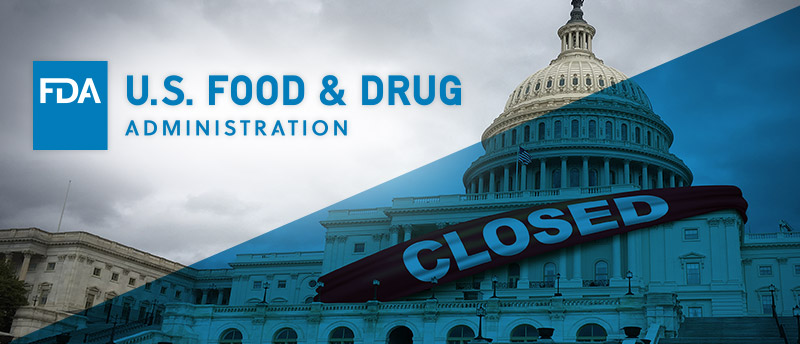Drug and Device Safety During the 2019 Government Shutdown

As the partial federal government shutdown stretches into its third week, even people who don't work for the government are beginning to feel its effects. With 9 of 15 federal departments currently shut down, news feeds are brimming with stories of garbage overflow in national parks, a wave of TSA employees calling in sick, and dwindling funding for important government nutrition programs. But what about the government programs that keep our food, drugs, and medical devices safe?
Even though the Food and Drug Administration (FDA) provides vital health and safety services to consumers, it has not continued normal operations during this or previous government shutdowns. The FDA has officially stated that they continue "activities necessary to address imminent threats to the safety of human life" to the extent permitted by law, but the list of activities they do not continue is extensive. In order to keep consumers aware of the ways in which they may need to increase their own drug and device vigilance, we've studied official FDA statements about this and past government shutdowns. We've also spoken to FDA employees and private sector individuals currently engaged in FDA processes and compiled that information here.
The FDA Will Continue Monitoring Dangerous Products
Previous FDA contingency plans have made budget allowances for the continuation of activities related to the safety of human life during a partial government shutdown. As evidenced by the FDA's continued assistance in drug recalls such as the recall of valsartan drugs, the agency will maintain such activities despite the lack of funding.
Though no official statement has been made on FDA's drug label update activities, we can infer what may be happening from previous shutdowns. Dr. Taha Kass-Hout, who was the FDA's chief informatics officer during the 2013 shutdown, described a frustrating backlog of label updates. Companies were sending current information into the FDA where it would sit in a furloughed employee's inbox, waiting to be added to the correct databases. Even if those label updates contained important safety information, it wasn't being publicized through the appropriate government channels.
Though the government may not publicize labeling updates right now, consumers can go to a drug manufacturer's website to confirm information on any new or existing prescriptions during the shutdown.
FDA Will Maintain Existing Approval Processes
Since medical and pharmaceutical manufacturers fund drug and device approval processes by paying fees, those processes will continue in spite of the shutdown. We spoke to a manufacturer's representative currently involved in a 510(k) approval process, and he confirmed that there have been no delays in scheduled meetings with the FDA.
The FDA adheres to specified timelines when reviewing most drug and device applications in an effort to facilitate timely approval of new and helpful technologies. If existing approval processes did not continue throughout the shutdown, that could have encouraged hasty approval decisions. And rushed decisions are exactly how products like Essure birth control hit the market before their safety could be reliably assessed. So it comes as a relief that existing approval processes will continue throughout the shutdown.
During the shutdown period, the FDA is not legally authorized to accept user fees for any 2019 applications. Thus, they will not accept any new drug or device approval applications until a funding bill is passed. Only approvals already in process prior to the start of the shutdown can continue at the moment. This will delay the development and market release of new drugs and devices for as long as the shutdown continues.
FDA Efforts to Combat Teen Vaping May Be On Hold
Last November the FDA released a plan to curb the teen vaping epidemic. The plan proposed a long list of objectives like creating new regulations, providing better access to nicotine cessation products, and preventing youth access to tobacco products altogether. No official statement has been made regarding the effect of the government shutdown on this specific FDA initiative, but we know it is not funded through manufacturer's submission fees. Teen vaping must also fall lower on the priority list than monitoring and publicizing dangerous drugs in need of additional safety warnings like the infamous black box warning. So the FDA will most likely use any carryover funding to maintain higher priority activities than the prevention of teen vaping.
At this time, no alternative dates have been proposed for the next public hearing on this matter, originally scheduled for January 18, 2019. If the government shutdown continues until or beyond that date, we will know with certainty exactly how the proposed teen vaping initiative has fared in the absence of funding.
FDA Employees Are Likely to Receive Back Pay
I'm not trying to sugarcoat this. It's going to go until the next Congress.
PBSFDA Commissioner Scott Gottlieb has publicly thanked the thousands of employees currently maintaining operations without pay. Employees engaged in activities funded by user fees and funding carryovers may still receive paychecks, but others will have to hope for back pay. One furloughed FDA employee expressed confidence that Congress would authorize retroactive pay for employees working through the shutdown without funding, but not all federal employees share that sense of optimism.
Historically, Congress has always allocated back pay for furloughed federal employees, which underscores the frustration many people feel about the shutdown. Though many federal employees are rightfully staying home, taxpayers will retroactively fund the activities they should have maintained during the shutdown, only seeing the fruits of those activities when they've been paid for a second time.
Still Want to Know More?
Despite running on a skeleton crew, the FDA is maintaining all operations essential to the health and safety of American consumers. We have no reason to believe drug or device safety will be noticeably impacted at this stage, but that could change depending on how long this shutdown lasts.
Whether the government is shut down or not, you can always get up to the minute news about the FDA's ongoing consumer protection activities here:
